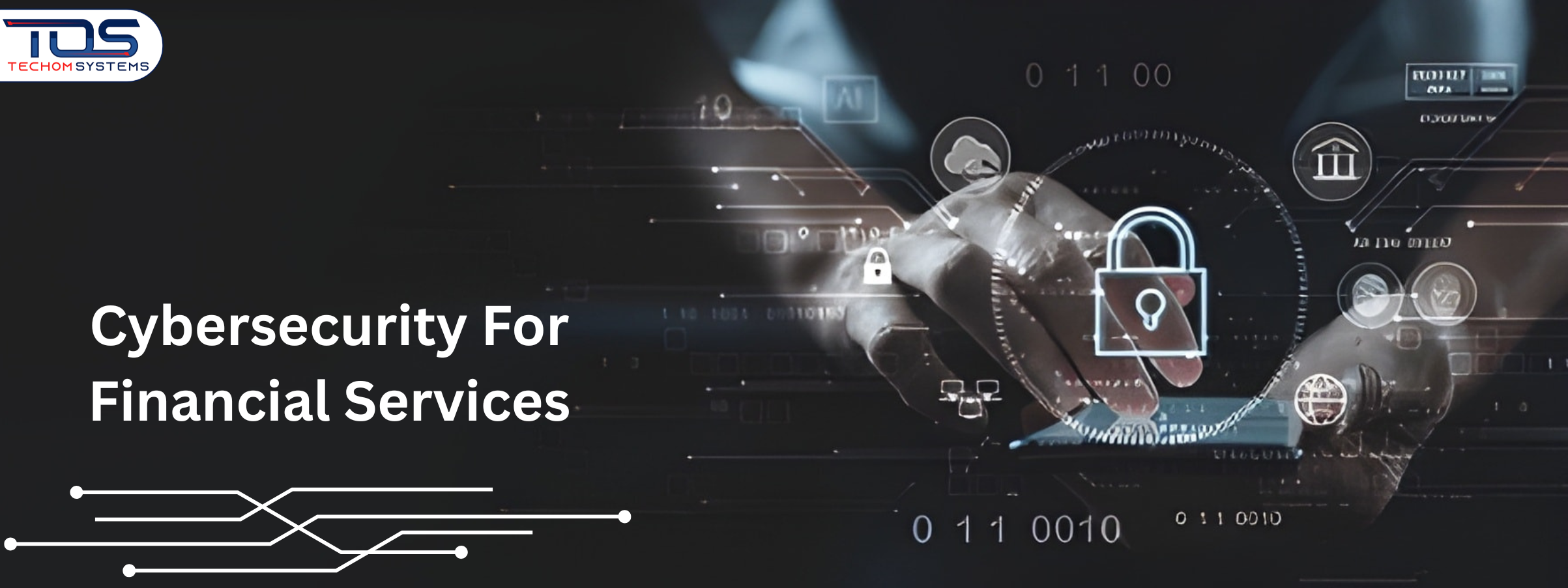Summary: Cybersecurity for financial services has become the backbone of modern banking, ensuring data protection, compliance and customer trust in an increasingly digital world. From phishing and ransomware to insider threats and third-party vulnerabilities, financial institutions must adopt robust information systems security management practices. A proactive approach not only safeguards assets but also strengthens resilience against evolving cyber risks.
Connecting with experts like TECHOM Systems can help your organization build a secure, compliant and future-ready financial ecosystem. Contact TECHOM Systems and book a free consultation by clicking the button below…
Have you ever wondered what would happen if a bank’s digital systems were compromised overnight? Imagine logging into your account only to find your data missing or, worse, your funds redirected. In an era where nearly every transaction is digital, financial institutions face the challenge of staying secure while remaining accessible. As someone who has seen technology evolve rapidly in the financial world, I can tell you that cybersecurity for financial services is no longer an optional investment—it’s a fundamental necessity.
Let’s explore how cybersecurity not only protects financial institutions but also redefines the modern banking landscape.
Understanding Cybersecurity For Financial Services

Cybersecurity for financial services refers to the strategies, technologies and governance models designed to protect sensitive financial data and digital infrastructures from cyber threats. This includes everything from online banking systems and ATMs to mobile apps and cloud-based transaction platforms.
In simple terms, it’s about safeguarding the backbone of our financial ecosystem. The finance industry holds vast amounts of personal and corporate data, making it one of the most targeted sectors for cybercriminals. That’s why adopting strong security frameworks such as information systems security management has become vital to maintaining trust and operational stability.
When I work with clients, I often emphasize that cybersecurity isn’t just about protecting data—it’s about protecting reputation, compliance and customer confidence.
Why Cybersecurity Matters In The Financial Sector?
The financial sector operates in a constant state of risk. Every transaction, database entry and digital signature carries potential vulnerabilities. Cybersecurity for financial services ensures that these systems remain resilient even against advanced cyberattacks.
Without a comprehensive security framework, financial organizations face:
- Data breaches that compromise customer information
- Financial losses due to fraudulent transactions
- Regulatory penalties for failing to meet compliance standards
- Loss of customer trust and brand credibility
Investing in cybersecurity for banking is not just a defensive move, it’s a strategic business decision. Banks and financial institutions must adopt proactive measures that combine prevention, detection and real-time response.
Did You Know?
According to industry reports, over 60% of financial organizations experienced at least one cyberattack in the past year, with phishing and ransomware leading the list. Alarmingly, the cost of cybercrime in the financial sector is projected to exceed $400 billion globally in the next few years.
This highlights why strengthening information systems security management and cybersecurity governance is critical to ensuring long-term resilience.
Key Threats In The Financial Industry

The financial sector operates in a high-stakes environment where even a single vulnerability can have massive repercussions. As technology advances, so do the tactics of cybercriminals. Below are some of the most pressing challenges financial institutions encounter today:
1. Phishing Attacks:
These are among the most common and dangerous threats. Fraudsters craft convincing emails or clone legitimate websites to deceive employees or customers into sharing sensitive data, such as login credentials or banking details. Even a single successful phishing attempt can compromise entire systems or customer accounts.
2. Ransomware:
Cybercriminals encrypt critical financial data and demand payment, often in cryptocurrency for its release. For banks and financial firms, this can mean halted operations, lost customer trust and costly downtime. Modern ransomware is increasingly targeted and sophisticated, making prevention essential.
3. Insider Threats:
Sometimes, the danger comes from within. Disgruntled employees, negligent staff or compromised insiders can unintentionally or deliberately create openings for data breaches. These risks highlight why continuous monitoring, employee training and strict access controls are vital.
4. Third-Party Risks:
Financial institutions rely on various vendors, cloud providers and fintech partners. If these third parties have weak security postures, they can become backdoors for attackers to infiltrate primary systems. Proper vendor risk assessments and consistent monitoring are key to minimizing such vulnerabilities.
5. Regulatory Non-Compliance:
Banks and financial services operate under strict data protection regulations. Failing to comply with frameworks such as PCI DSS or GDPR can lead not only to hefty fines but also severe reputational damage. Compliance must be integrated into every aspect of cybersecurity strategy.
A proactive cybersecurity audit is the best defense against these evolving threats. It helps organizations detect weak spots, strengthen defenses and implement tailored security measures before an incident occurs. Staying ahead of these risks isn’t just good practice, it’s essential for trust and stability in today’s digital banking world.
Protect your financial systems before threats strike, Contact TECHOM Systems today and secure your future with expert cybersecurity solutions.
How Cybersecurity For Financial Services Protects Institutions

Effective cybersecurity for financial services creates a multi-layered defense that safeguards both customer data and institutional operations. Here’s how:
- Risk Assessment and Management: Regular assessments ensure every digital asset is monitored for vulnerabilities.
- Employee Awareness: Training employees on phishing and malware recognition strengthens the first line of defense.
- Incident Response Planning: Well-defined strategies help institutions act quickly during security breaches.
- Continuous Monitoring: Real-time surveillance tools detect suspicious activities before damage occurs.
At TECHOM Systems, I’ve seen how these measures, when properly implemented, reduce breach incidents significantly while improving customer trust.
Free Tips For You: Top 9 Effective Ways to Protect Business Data and Systems
The Role Of Cybersecurity Governance
Cybersecurity governance ensures that security practices align with an organization’s overall business goals and compliance standards. It sets the framework for decision-making, accountability and policy enforcement.
Financial institutions that implement robust governance structures not only manage risks better but also demonstrate regulatory compliance—an essential factor in maintaining customer confidence.
I often advise decision-makers to integrate information systems security management within their governance strategy. This ensures that both IT and business units share a unified vision for digital protection.
Phishing Defense For Finance Industry

The phishing defense for finance industry has become one of the most crucial aspects of cybersecurity. Since most cyberattacks start with a single deceptive email, banks must train their employees and customers to recognize signs of phishing.
Modern defense mechanisms include:
- Advanced spam filters that detect suspicious emails.
- Multi-factor authentication to prevent unauthorized access.
- Simulated phishing campaigns to test and educate employees.
At TECHOM Systems, I often recommend a blend of automation and human vigilance. Technology can flag potential threats, but awareness remains the strongest defense.
The Importance Of A Cybersecurity Audit
A cybersecurity audit serves as the foundation for any strong security strategy. It’s a comprehensive review that identifies gaps, measures risk exposure and ensures compliance with regulatory frameworks.
Through regular audits, financial institutions can:
- Detect vulnerabilities before hackers do.
- Validate their existing security infrastructure.
- Strengthen incident response protocols.
- Align operations with global cybersecurity standards.
When I consult clients, I often stress that skipping audits is like driving without checking your brakes—it may work for a while, but the risk isn’t worth it. TECHOM Systems helps clients conduct end-to-end audits to ensure no aspect of their digital security is overlooked.
Cybersecurity For Banking: A Closer Look
Banks today are more digital than ever. From online transactions to AI-powered financial tools, technology drives every aspect of modern banking. However, greater connectivity also brings increased risk.
Cybersecurity for banking ensures that customer data, financial records and transaction networks remain secure. Advanced encryption, continuous monitoring and strict access controls form the backbone of secure banking environments.
Banks adopting TECHOM Systems’ cybersecurity frameworks have reported fewer incidents of data breaches and improved customer confidence. That’s the power of a well-implemented security strategy.
What Should I Do Now?
If you are reading this and realizing your financial organization might not be fully protected, you are not alone. Many businesses only start prioritizing cybersecurity after an incident occurs, but prevention is always more effective than recovery.
Here’s what I recommend you do next:
- Schedule a cybersecurity audit to evaluate your current security posture.
- Assess your governance policies to ensure they align with industry standards.
- Invest in phishing defense programs to build awareness across your team.
- Connect with experts like TECHOM Systems who specialize in financial cybersecurity solutions.
I encourage you to take proactive steps before your systems face a real threat. You can email our team at hello@techomsystems.com.au to get started on a tailored cybersecurity roadmap.
How TECHOM Systems Strengthens Cybersecurity For Financial Services
TECHOM Systems specializes in delivering tailored cybersecurity for financial services solutions designed to match the complexity of modern banking and finance.
Our approach focuses on:
- Conducting in-depth cybersecurity audits to identify hidden vulnerabilities.
- Implementing comprehensive cybersecurity governance frameworks for long-term compliance.
- Enhancing phishing defense for finance industry through intelligent detection tools.
- Integrating information systems security to unify security protocols across departments.
I’ve personally seen how these strategies empower financial organizations to not just defend against cyberattacks but to thrive confidently in a digital-first economy.
If your institution is ready to take cybersecurity seriously, you can reach out to our expert team at hello@techomsystems.com.au for a detailed consultation.
Frequently Asked Questions
#1: How does cybersecurity governance benefit financial organizations?
Ans. Cybersecurity governance ensures security policies align with business goals and regulations. It promotes accountability, risk management and long-term data protection across all digital systems and departments.
#2: How does phishing defense improve customer trust?
Ans. Strong phishing defense programs protect customers from fraud attempts, making them feel safer while using online banking or payment systems, ultimately improving brand trust.
#3: What makes financial data a prime target for hackers?
Ans. Financial data contains sensitive personal and transactional details that can be exploited for identity theft or fraud. Its high value makes financial institutions a top priority for cybercriminals.
Conclusion
The modern financial landscape is fast, digital and interconnected. With cyber threats growing in scale and sophistication, cybersecurity for financial services has become the cornerstone of trust, compliance and long-term business stability.
From cybersecurity audits to information systems security management, every measure counts toward building a safer, smarter and more resilient financial future.
I strongly believe that organizations that invest in robust cybersecurity today will define the secure banking ecosystem of tomorrow. And if you are ready to strengthen your defense, the experts at TECHOM Systems are just an email away at hello@techomsystems.com.au — ready to help you secure, protect and grow with confidence. Contact TECHOM Systems today to get started…and feel free to share your thoughts by commenting below, I would love to reply to your comments..
Paul brings 15+ years of experience designing and stabilizing Technologies, cloud infrastructures and AI-driven solutions. His approach is grounded in curiosity and precision, analysing challenges, breaking them down and implementing solutions that reduce risk and downtime. Known for bringing calm to complex technical situations, Paul helps organizations harness technology efficiently, from cloud migrations to AI deployments. His ability to restore clarity and stability makes him a trusted partner for teams navigating digital transformation. Paul’s mission is to ensure technology is not just functional but strategically empowering.





